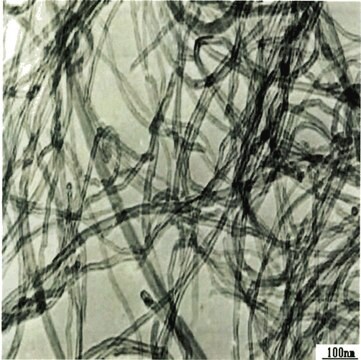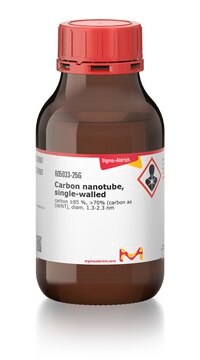406074
Carbon nanotube, multi-walled
powdered cylinder cores, 20-30% MWCNT basis, O.D. × L 7-12 nm × 0.5-10 μm, avg. no. of layers, 5 ‑ 20
Sinónimos:
MWCNT, MWNT, Multiwall carbon nanotube
About This Item
Productos recomendados
Quality Level
assay
20-30% MWCNT basis
form
powder
feature
avg. no. of layers 5 ‑ 20
composition
carbon content, >99% TGA
O.D. × L
7-12 nm × 0.5-10 μm
avg. part. size
−270 mesh
<53 μm
mp
3652-3697 °C (lit.)
density
~2.1 g/mL at 25 °C (lit.)
¿Está buscando productos similares? Visita Guía de comparación de productos
General description
Application
Physical form
Preparation Note
Other Notes
Storage Class
11 - Combustible Solids
wgk_germany
WGK 3
flash_point_f
Not applicable
flash_point_c
Not applicable
ppe
dust mask type N95 (US), Eyeshields, Gloves
Elija entre una de las versiones más recientes:
¿Ya tiene este producto?
Encuentre la documentación para los productos que ha comprado recientemente en la Biblioteca de documentos.
Los clientes también vieron
Artículos
Carbon nanotubes (CNTs) have received much attention since their discovery in 1991 by Sumio lijima1 due to their excellent mechanical, electrical, and optical properties.
A nanocomposite is typically defined as a mixture between a host material (e.g., polymer matrix) and nanofillers with at least one dimension of less than 100 nm.
Single-walled carbon nanotubes (SWCNTs) are promising materials for use in the active channel of field-effect transistors (FETs), photoabsorbing layers of solar cells and photodetectors because of their ultrafast charge transport mobility.
Building and Engineering Micro/Nano Architectures of Single-Walled Carbon Nanotubes for Electronic Applications
Nuestro equipo de científicos tiene experiencia en todas las áreas de investigación: Ciencias de la vida, Ciencia de los materiales, Síntesis química, Cromatografía, Analítica y muchas otras.
Póngase en contacto con el Servicio técnico





